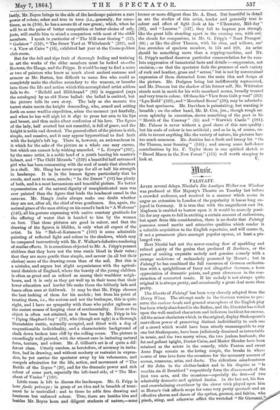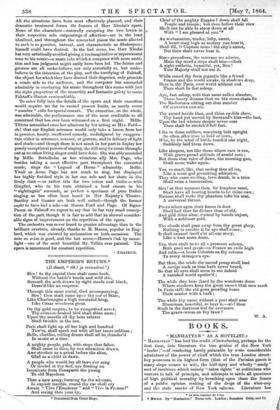Dusk,
FALSTAFF.
AFTER several delays, Nicolai's Die Lustigen Welber von Windsor was produced at Her Majesty's Theatre on Tuesday lost before a crowded audience, and received in a manner which seems to augur an extension to London of the popularity it basso long en- joyed in Germany. It is true that with the magnificent cast Mr. Mapleson is enabled to bestow upon it it would be scarcely possi- ble for any opera to fail in exciting a certain amount of enthusiasm, but apart from this consideration, there is no doubt that Falstaff possesses sound merits and attractive qualities which render it a valuable acquisition to the English repertoire, and will ensure it, if not a permanent place amongst popular operas, at least a pro- longed run.
Herr Nicolai had not the never-ceasing flow of sparkling and refined gaiety of the genius that produced Ii Barbiere, or the power of uniting exquisite melody and genuine comedy with a strange undertone of melancholy possessed by Mozart ; but in Falstaff he has combined the full resources of German orchestra- tion with a sprightliness of fancy not altogether German, a keen appreciation of dramatic points, and great cleverness in the con- struction of concerted music. If his melody is not always quite original it is always pretty, and occasionally a great deal more than pretty.
The libretto of Falstaff has been very cleverly adapted from the Merry Wives. The attempt made in the German version to pre- serve the couleur locale and general atmosphere of the English play has been wisely abandoned in the Italian, and the librettist has relied upon the well-marked characters and ludicrous incident for success. All the minor chaiacters which, in the original, display Shakespeare's marvellous power of preserving distinct individuality to each one of a crowd which would have been utterly unmanageable to any one but Shakespeare, have been judiciously dismissed as intractable in music, and the two merry wives, the two jealous husbands, the fat and gallant knight, Doctor Caius, and Master Slender have been retained as the actors in the comedy, while Fenton and sweet Anne Page remain as the loving couple, the breaks in whose course of true love form the occasions for the necessary amount of scenes, romauzas, arias, and duets. The ridiculous Misadventures of Sir John in the clothes-basket and in his disguise as " la vecchia zia di Brentford " respectively form the denouements of the first two acts, and the occasions—especially the first—of two admirably dramatic and spirited finales. In the last act, his fina and overwhelming overthrow by the clever trick played upon him at Herne's Oak affords scope for some very pretty spectacle and an effective chorus and dance of the sprites, gnomes, and fairies, who pinch, sting, and otherwise afflict the wretched "Sir Giovanni." All the situations have been most effectively planned, and their dramatic treatment forms the feature of Herr Nicolai's opera.
None of the characters—naturally excepting the two lovers in their respective solo outpourings of affection—are in the least idealized, and throughout the concerted pieces the music allotted to each is as genuine, natural, and characteristic as Shakespeare himself could have desired. In the last scene, too, Herr Nicolai has very artisticallyavoided giving a too imaginative or supernatural tone to his music—a snare into which a composer with more ambi- tion and less judgment might easily have been led. The fairies and gnomes are all make-believe, not only materially so, but make- believe in the intention of the play, and the terrifying of Falstaff, the object for which they have donned their disguises, only presents a comic side to the audience, and the composer has succeeded admirably in overlaying his music throughout this scene with just the right proportion of the unearthly and fantastic gaiety to make Falstaff's illusion vraisemblable.
To enter fully into the details of the opera and their execution would require me far to exceed present limits, as nearly every " number " calls for special remark. The execution, on the whole, was admirable, the performance one of the most creditable to all concerned that has ever been witnessed on a first night. Mdlle. Titiens astonished even her admirers by her acting as Mrs. Ford— oh ! that our English actresses would only take a lesson from her in genuine, hearty, unaffected comedy, undisfigured by exaggera- tion either in utterance, manner, or gesture, and in delicacy of light and shade—and though there is not much in her part to display her purely exceptional powers of singing, she still sang its music through- out as no other living singer could have done. She was ably seconded by Mdlle. Bettelheim as her vivacious ally Mrs. Page, who besides taking a most effective part throughout the concerted music, sings the "Legend of Herne" admirably. Mdlle. Vitali as Anne Page has not much to sing, but displayed her highly finished style in her one solo and her share in the lively duet —or rather trio for two voices and violin— with Giuglini, who in his turn obtained a loud encore in his "nightingale" serenade, as perfect a specimen of pure Italian singing as has often been heard in Her Majesty's Theatre. Santley and Gassier are both well suited—though the former ought to have had a solo—as Messrs. Ford and Page. Of Signor Panca as Falstaff we regret to say that he has very small concep- tion of the part, though it is fair to add that he showed consider- able signs of improvement on the repetition of the opera.
The orchestra was never heard to greater advantage than in the brilliant overture, already, thanks to M. Manna, popular in Eng- land, which was encored by acclamation on both occasions. The mise en scene is good, and the last scene—Herne's Oak by moon- light —one of the most beautiful Mr. Telbin ever painted. The opera is announced for constant repetition.
• AMATEUR.































 Previous page
Previous page